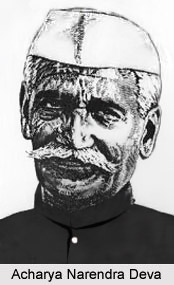 Acharya Narendra Deva, also known as Narendra Dev, was a renowned Indian freedom fighter, a nationalist and one of the leading theorists of the Congress Socialist Party in India. Acharya Narendra Deva advocated democratic socialism which rejected the various violent means as a matter of principle. Further more he considered the satyagraha (nonviolent resistance or civil resistance) movement as a proper method of revolution. Acharya Narendra Deva (Narendra Dev) was born in the year 1889. He was greatly influenced by the ideologies of Bal Gangadhar Tilak and Sri Aurobindo Ghose. Deva was initially employed as a teacher and during this period he became keenly interested in Buddhism and Marxism.
Acharya Narendra Deva, also known as Narendra Dev, was a renowned Indian freedom fighter, a nationalist and one of the leading theorists of the Congress Socialist Party in India. Acharya Narendra Deva advocated democratic socialism which rejected the various violent means as a matter of principle. Further more he considered the satyagraha (nonviolent resistance or civil resistance) movement as a proper method of revolution. Acharya Narendra Deva (Narendra Dev) was born in the year 1889. He was greatly influenced by the ideologies of Bal Gangadhar Tilak and Sri Aurobindo Ghose. Deva was initially employed as a teacher and during this period he became keenly interested in Buddhism and Marxism.
Acharya Narendra Deva was also took active participation in the Hindi language movement. Later he joined the Indian National Congress and became one of the major leaders of Congress Socialist Party since its inception in the year 1934. The Congress Socialist Party of India was established in the year 1934 as a socialist committee within the Indian National Congress Party. The members of the party usually rejected the anti-rational mysticism of Mahatma Gandhi and the sectarian approach of the Communist Party of India towards the Indian National Congress. The Congress Socialist Party of India was influenced by the ideologies of Marxism-Leninism and Fabianism. The Congress Socialist Party promoted decentralized socialism and believed that trade unions, co-operatives, local authorities and independent farmers should possess a considerable share of the economic power.
Acharya Narendra Deva or Narendra Dev was arrested by the British Indian Police for a number of times and was frequently imprisoned during the era of the Indian freedom struggle. At a later period, he was appointed as a member of the Uttar Pradesh legislative assembly. Narendra Deva also became the Vice Chancellor of Banaras Hindu University on 6 December 1951 and served the position till 31 May 1954. He became one of the most esteemed Vice Chancellor that the Banaras Hindu University (BHU) had in league with Pandit Madan Mohan Malviya, who was also was a noted an Indian freedom fighter and an educationist.
Acharya Narendra Deva supported and propagated the abolition of exploitation and poverty and not just through his belief in the Marxist materialist dialectic but particluarly on humanistic and moral grounds. Moreover he believed that without political democracy, social democracy was a deception. He actively participated in the peasant movement and was appointed as the President of the All India Kisan Congress, also known as All India Peasants Union and Akhil Bharatiya Kisan Sabha.
Acharya Narendra Deva was primarily an atheist and rejected the adoration and veneration of God that he argued, through implication, denigrated humankind. He continued to be linked with the Congress Socialist Party, as well as its descendant, the Praja Socialist Party even in his later life. Acharya Narendra Deva died in the year 1956.




















